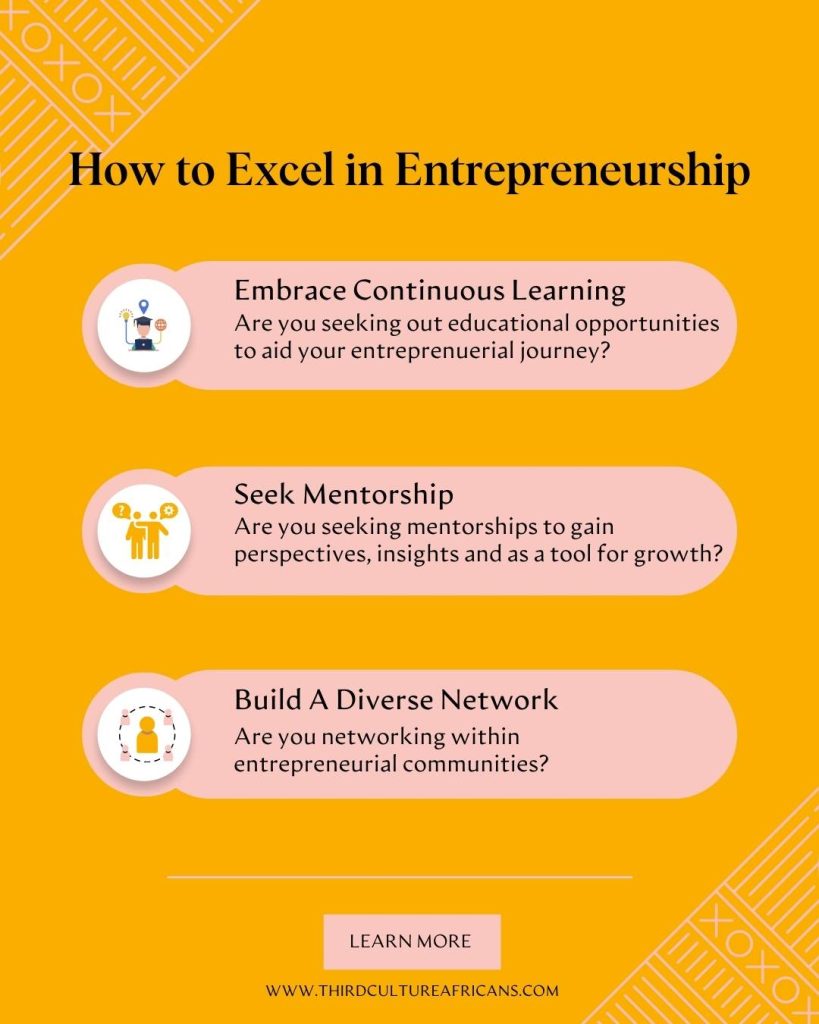Unlock Your Potential: The Essential Entrepreneurship Skills That Propel Global Leaders to Success
Introduction
Embark on a transformative journey as we delve into the crucial entrepreneurship skills that pave the way for success in today’s dynamic and interconnected world. Discover the keys to not just surviving but thriving in the entrepreneurial landscape. In a world characterized by rapid change and global connectivity, and entrepreneurs equipped with a diverse skill set are better positioned to navigate challenges and seize opportunities. So follow us as we discover what entrepreneurship is.
The Landscape of Entrepreneurship Skills
In the ever-evolving global context, the demands placed on entrepreneurs undergo continual transformation. This section delves into the shifting landscape of entrepreneurship, where factors ranging from the ascent of digital technologies to the growing emphasis on sustainability and social responsibility redefine the entrepreneurial terrain.
Digital Transformation:
The advent of digital technologies has revolutionized how businesses operate. Entrepreneurs now navigate an ecosystem shaped by the rapid integration of artificial intelligence, data analytics, and digital communication tools. This digital transformation not only enhances operational efficiency but also opens new avenues for market reach, customer engagement, and innovative business models.
Sustainability and Social Responsibility:
Contemporary entrepreneurship is marked by an increased awareness of the environmental and social impact of business activities. Sustainability and social responsibility have emerged as integral components of entrepreneurial success. Entrepreneurs are expected to consider the ecological footprint of their ventures, engage in ethical business practices, and contribute positively to societal well-being.
Adaptability as a Competitive Edge:
Within this dynamic landscape, acquiring a diverse skill set is paramount for entrepreneurs to stay competitive. The ability to adapt to the changing nature of the business world becomes a strategic advantage. Entrepreneurs must continually evolve, embracing new technologies, understanding shifting consumer preferences, and aligning their ventures with emerging trends.
Diversity in Skill Set:
The entrepreneurial journey now demands a breadth of skills beyond traditional business acumen. Entrepreneurs need to be adept at not only financial management but also digital marketing, sustainable practices, and social impact strategies. A diverse skill set equips entrepreneurs to address multifaceted challenges, fostering innovation and resilience.
Essentiality of Adaptation:
The landscape of entrepreneurship is characterized by its fluidity. Entrepreneurs who fail to adapt risk being left behind. This section emphasizes why acquiring a diverse skill set is not merely advantageous but essential for staying competitive. Entrepreneurs who cultivate a versatile skill portfolio can proactively respond to market shifts, capitalize on emerging opportunities, and navigate challenges with agility.
As we traverse this evolving landscape of entrepreneurship skills, the imperative becomes clear: entrepreneurs must embrace change, cultivate a diverse skill set, and actively participate in shaping the future of business. By doing so, they not only stay relevant in the dynamic business environment but also contribute to the positive evolution of the entrepreneurial landscape as a whole.
Ready to Take Your Entrepreneurial Journey to The Next Level?
Learn More about Mastering Entrepreneurship Skills and Staying Ahead in The Global Market!
Key Entrepreneurship Skills Unveiled
In the dynamic landscape of entrepreneurship, possessing a robust set of skills is a cornerstone for achieving business success. Entrepreneurs equipped with essential skills such as adaptability, effective communication, and financial literacy are empowered to make strategic decisions, navigate challenges, and foster innovation within their ventures:
Adaptability:
“According to a study by the Global Entrepreneurship Monitor, 74% of successful entrepreneurs attribute adaptability as a key factor in their success.” Adaptability serves as a cornerstone for navigating the dynamic landscapes of fast-paced and ever-changing markets and industries. Successful entrepreneurs don’t merely weather change – they embrace it as an opportunity for innovation. Real-world examples, such as companies pivoting during economic downturns or adapting to technological disruptions, vividly illustrate the pivotal role adaptability plays in entrepreneurial success. The ability to pivot, embrace change, and navigate uncertainties is a crucial skill. Adaptable entrepreneurs can seize new opportunities, adjust strategies in response to market shifts, and maintain resilience in the face of challenges.
Effective Communication:
Effective communication transcends the mere conveyance of information; it is about inspiring and aligning teams toward a common vision. It is a linchpin for successful entrepreneurship. Communication strategies enable entrepreneurs to convey complex ideas concisely, fostering collaboration and understanding within and beyond the organization. “Entrepreneurs with effective communication skills are 50% more likely to attract and retain customers, as per a survey by Forbes.” The ability to articulate a compelling vision can be a driving force behind customer loyalty and organizational cohesion. Entrepreneurs with strong communication skills can articulate their vision, values, and business propositions clearly. This skill extends beyond external interactions to internal communication within teams, fostering collaboration and creating a shared sense of purpose.
Financial Literacy:
Financial literacy is a fundamental entrepreneurship skill that directly impacts strategic decision-making. Financial literacy empowers entrepreneurs to navigate the intricacies of budgeting, forecasting, and investment. “A report by Intuit found that small business owners with strong financial literacy skills see a 25% increase in revenue compared to those with limited financial knowledge.” By unravelling the complexities of financial literacy, entrepreneurs can position themselves to make sound financial decisions, ensuring the sustainability and growth of their ventures. Entrepreneurs well-versed in financial concepts can analyze budgets, assess risks, and make informed choices that contribute to the long-term sustainability of their businesses. This skill is particularly critical for managing cash flow, securing funding, and achieving overall financial stability.

Developing and Enhancing Entrepreneurship Skills
For individuals aspiring to excel in entrepreneurship, the journey to mastery involves a commitment to continuous learning, mentorship, and building a robust professional network. This section provides practical tips to guide individuals on the path to developing and enhancing their entrepreneurship skills.
- Embrace Continuous Learning:
- Engage in online courses, workshops, and industry conferences to stay abreast of the latest trends and developments.
- Actively seek out educational opportunities that align with your entrepreneurial goals and interests.
- Cultivate a mindset of curiosity and a commitment to ongoing self-improvement.
- Seek Mentorship:
- Connect with seasoned entrepreneurs who can provide valuable insights and advice based on their experiences.
- Actively seek mentorship relationships to gain perspectives from those who have navigated similar entrepreneurial challenges.
- Leverage mentorship as a powerful tool for personal and professional growth.
- Build a Diverse Network:
- Attend networking events tailored to entrepreneurs and business professionals.
- Participate in entrepreneurial communities both online and offline to expand your network.
- Foster relationships with individuals from diverse backgrounds and industries to gain a well-rounded perspective on entrepreneurship.
The Impact of Entrepreneurship Skills on Business Success
Driving Innovation:
Entrepreneurs possessing these skills become catalysts for innovation within their enterprises. The adaptability to embrace new ideas, coupled with effective communication to convey innovative concepts, creates a fertile ground for creativity. Financial literacy ensures that innovative ideas are not only conceptualised but also feasibly implemented, leading to tangible business outcomes.
Correlation with Increased Profitability:
Statistics underscore the tangible benefits of honing entrepreneurship skills. Studies show a direct correlation between developed skills and increased business profitability. Entrepreneurs who actively cultivate adaptability, effective communication, and financial literacy are more likely to navigate challenges successfully, seize growth opportunities, and ultimately drive their ventures towards higher levels of profitability.
By exploring and enhancing these entrepreneurship skills, business leaders can not only weather the complexities of the entrepreneurial journey but also position their ventures for sustained success. The impact of these skills extends far beyond the individual entrepreneur, influencing the entire ecosystem of the business and contributing to the overall vibrancy and resilience of the entrepreneurial landscape.
Entrepreneurship Skills in a Globalized Economy
In the contemporary landscape of entrepreneurship, the influence of globalization has reshaped the skills required for success. Entrepreneurs operating in a globalized economy face unique challenges and opportunities that necessitate a heightened level of adaptability and strategic acumen.
Navigating Cross-Cultural Communication:
One of the key skills heightened in a globalized economy is cross-cultural communication. Entrepreneurs must possess the ability to effectively communicate and collaborate with individuals from diverse cultural backgrounds. Understanding and respecting cultural nuances become essential components of building successful international partnerships and fostering inclusive work environments.
Understanding International Markets:
Entrepreneurs aiming for success in a globalized economy must be adept at understanding international markets. This involves conducting thorough market research, identifying trends, and recognizing the unique demands and preferences of consumers in different regions. By staying attuned to the intricacies of diverse markets, entrepreneurs position themselves to make informed decisions that drive business growth on a global scale.
Adapting Business Strategies to Different Markets:
Flexibility in adapting business strategies to align with the dynamics of different markets is a critical skill in a globalized economy. Entrepreneurs need to recognize that a one-size-fits-all approach may not be effective. Instead, tailoring strategies to suit the cultural, economic, and regulatory landscapes of specific regions enhances the likelihood of success in diverse markets.
Fostering a Global Mindset:
Fostering a global mindset is more than just understanding international markets; it’s about embracing a worldview that transcends borders. Entrepreneurs with a global mindset are open to diverse perspectives, agile in their approach to change, and proactive in seeking opportunities on a global scale. This mindset allows entrepreneurs to navigate the complexities of a globalized economy with resilience and innovation.

Conclusion
As we conclude our exploration of entrepreneurship skills, it’s evident that success in the entrepreneurial landscape requires more than just a great idea. It demands a holistic skill set encompassing adaptability, effective communication, financial literacy, and a global perspective. Entrepreneurs who continually develop and refine these skills position themselves not only for survival but for sustained growth and influence in the ever-changing business world.












